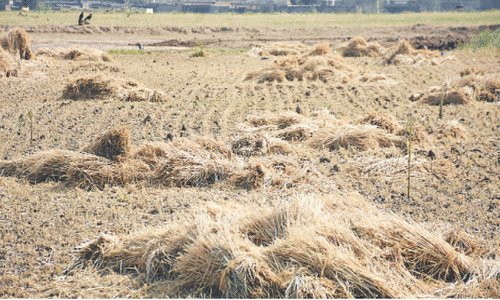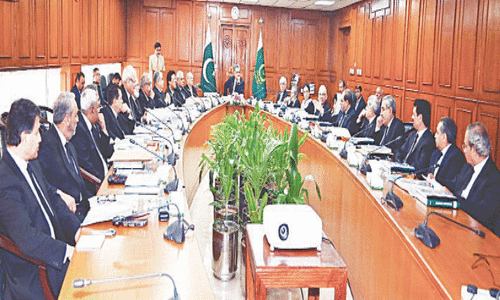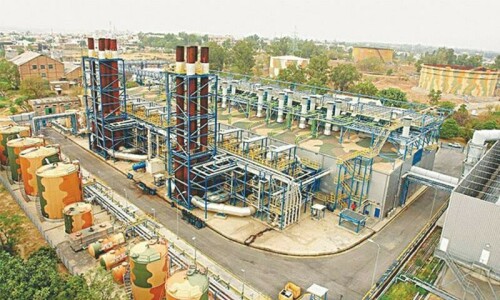ISLAMABAD: Senators protested on Wednesday over the change of route of the multi-billion dollar Pak-China Economic Corridor project, allegedly bypassing areas populated by Baloch and Pakhtun people, on the desire of China. They also severely criticised the alleged criminal negligence and corruption in two water supply projects in Quetta and Karachi.
The protests emerged at a meeting of the Senate Standing Committee on Finance and Revenue presided over by Nasrin Jalil of the MQM on next year’s budgetary proposals.
During the meeting, Fateh Mohammad Hassani quoted Maulana Fazlur Rehman of the JUI as saying that Baloch and Pakhtun populated areas along the route to Gwadar port had been excluded from the corridor.
But the planning commission claimed that the change was made on a request by the Chinese ambassador.
Mr Hassani said that the maulana had also taken up the matter with the Chinese ambassador who declined to have played any role, saying the change in the route was the prerogative of the government of Pakistan.
Planning and Development Secretary Hassan Nawaz Tarar confirmed that “the proposal (to change the route) was on the table” because the Chinese said they could not finance longer route.
Later, Minister for Planning and Development Ahsan Iqbal joined the meeting and confirmed a change of plan on the corridor project with a different spin.
He said two different routes namely eastern route — Karachi-Lahore-Gwadar and western route (Islamabad, D.I. Khan, D.G. Khan and Gwadar) — were part of the corridor project.
Mr Iqbal said the government was now following the eastern route because it was one of the few early harvest components of the corridor project that could be completed in 4-5 years on build, own and operate (BOT) basis because of commercial viability of some of its sections.
For example, he said, Karachi-Hyderabad, Karachi-Sukkur and Karachi-Lahore sections of the eastern route could be easily developed on BOT basis while some other sections could be chipped in by public sector financing or other borrowing models.
The minister said the government would move to the next phase after reaping economic benefits of the first phase and by the time the national economy would become strong enough to take on big projects.
On the other hand, he said, the western route required heavy international borrowing with repayment capacity problem which the country could not afford while remaining under an IMF programme.
He said the first phase of the corridor project involving the eastern route would need a financing of about $35 billion while the entire project cost would run into $100bn or so.
The senators criticised the government for accepting every demand of the Chinese government and investors even though the corridor was the cheapest logistical link and a very beneficial project for China that wanted to develop its western region for future economic growth.
Mr Iqbal agreed, but said that the economic cooperation between two friendly nations had to be a win-win situation; otherwise China could consider any other logistic route.
WATER SUPPLY PROJECTS: The committee took strong exception to a Rs12bn water supply project for Quetta when told that it did not flow water in its pipelines despite spending Rs10bn.
Mr Iqbal informed the meeting that he had taken up the project at the level of Council of Common Interests and got ordered its financial and technical audit from independent auditors to fix responsibility for the delay.
The senators from Balochistan — Fateh Mohammad Hassani and Kulsoom Parveen — informed the committee that the pipeline network had been completed, but the source of water had not been developed, resulting in waste of huge public money.
They alleged that a former additional chief secretary and managing director of the Water and Sewerage Agency, Quetta, had spent Rs5bn in Australia on shopping without any formalities and even pipes were not traceable.
They said the former Wasa chief was still working in the government and the National Accountability Bureau had failed to complete its investigation in more than eight years, while Quetta faced existential issue due to water shortage.
The committee noted with concern increasing water supply problems in Karachi as its chairperson told the meeting that tanker mafia had taken over most parts of the city.
She said the funds allocated for K4 scheme (additional drinking water for Karachi) were insufficient.
The committee recommended that funds for the scheme should be increased to ensure its completion during the next financial year.
Published in Dawn, June 12th, 2014














































